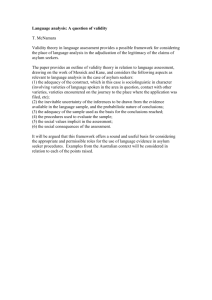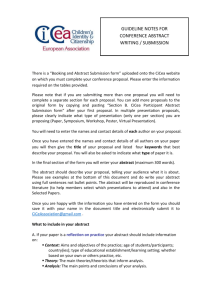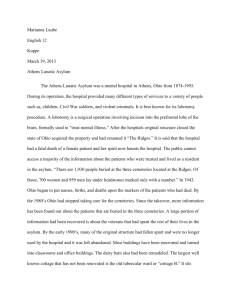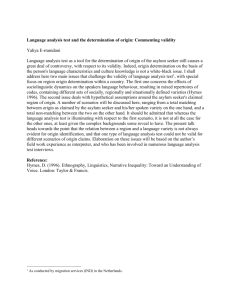Document 12426147
advertisement
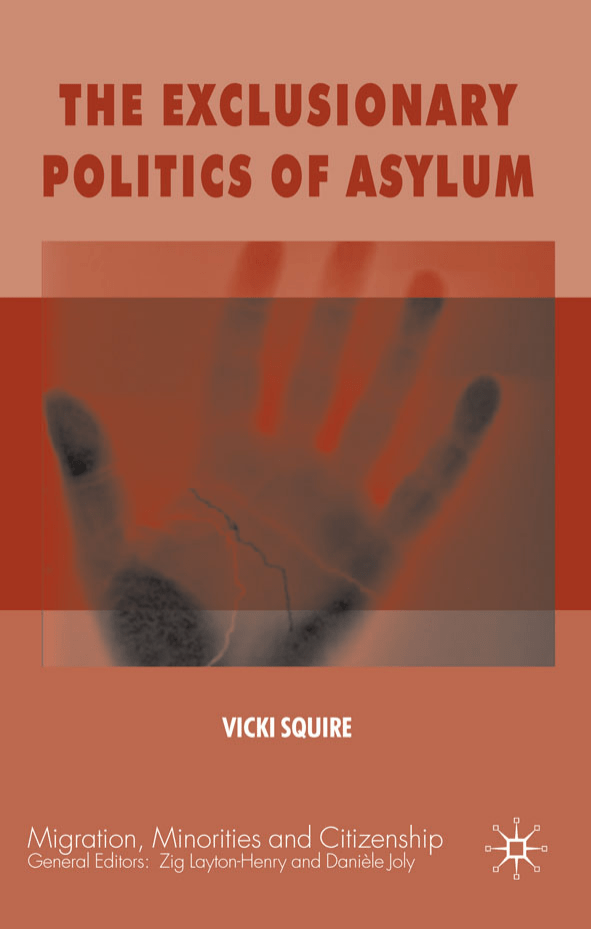
Migration, Minorities and Citizenship General Editors: Zig Layton-Henry, Professor of Politics, University of Warwick; and Danièle Joly, Professor, Director, Centre for Research in Ethnic Relations, University of Warwick Muhammad Anwar, Patrick Roach and Ranjit Sondhi (editors) FROM LEGISLATION TO INTEGRATION? Race Relations in Britain James A. Beckford, Danièle Joly and Farhad Khosrokhavar MUSLIMS IN PRISON Challenge and Change in Britain and France Thomas Faist and Andreas Ette (editors) THE EUROPEANIZATION OF NATIONAL POLICIES AND POLITICS OF IMMIGRATION Between Autonomy and the European Union Thomas Faist and Peter Kivisto (editors) DUAL CITIZENSHIP IN GLOBAL PERSPECTIVE From Unitary to Multiple Citizenship Adrian Favell PHILOSOPHIES OF INTEGRATION Immigration and the Idea of Citizenship in France and Britain Agata Górny and Paulo Ruspini (editors) MIGRATION IN THE NEW EUROPE East-West Revisited James Hampshire CITIZENSHIP AND BELONGING Immigration and the Politics of Democratic Governance in Postwar Britain John R. Hinnells (editor) RELIGIOUS RECONSTRUCTION IN THE SOUTH ASIAN DIASPORAS From One Generation to Another Danièle Joly GLOBAL CHANGES IN ASYLUM REGIMES (editor) Closing Doors Zig Layton-Henry and Czarina Wilpert (editors) CHALLENGING RACISM IN BRITAIN AND GERMANY Copyright material from www.palgraveconnect.com - licensed to University of Warwick - PalgraveConnect - 2013-01-10 Titles include: Jørgen S. Nielsen TOWARDS A EUROPEAN ISLAM 10.1057/9780230233614 - The Exclusionary Politics of Asylum, Vicki Squire PPL-UK_EP-Squire_FM.indd i 1/27/2009 2:07:08 PM Pontus Odmalm MIGRATION POLICIES AND POLITICAL PARTICIPATION Inclusion or Intrusion in Western Europe? Jan Rath (editor) IMMIGRANT BUSINESSES The Economic, Political and Social Environment Carl-Ulrik Schierup (editor) SCRAMBLE FOR THE BALKANS Nationalism, Globalism and the Political Economy of Reconstruction Vicki Squire THE EXCLUSIONARY POLITICS OF ASYLUM Maarten Vink LIMITS OF EUROPEAN CITIZENSHIP European Integration and Domestic Immigration Policies Östen Wahlbeck KURDISH DIASPORAS A Comparative Study of Kurdish Refugee Communities Migration, Minorities and Citizenship Series Standing Order ISBN 978-0-333-71047-0 (hardback) and 978-0-33380338-7 (paperback) (outside North America only) Copyright material from www.palgraveconnect.com - licensed to University of Warwick - PalgraveConnect - 2013-01-10 Aspasia Papadopoulou-Kourkoula TRANSIT MIGRATION The Missing Link Between Emigration and Settlement You can receive future titles in this series as they are published by placing a standing order. Please contact your bookseller or, in case of difficulty, write to us at the address below with your name and address, the title of the series and the ISBN quoted above. Customer Services Department, Macmillan Distribution Ltd, Houndmills, Basingstoke, Hampshire RG21 6XS, England 10.1057/9780230233614 - The Exclusionary Politics of Asylum, Vicki Squire PPL-UK_EP-Squire_FM.indd ii 1/27/2009 2:07:08 PM Vicki Squire The Open University, UK Copyright material from www.palgraveconnect.com - licensed to University of Warwick - PalgraveConnect - 2013-01-10 The Exclusionary Politics of Asylum 10.1057/9780230233614 - The Exclusionary Politics of Asylum, Vicki Squire PPL-UK_EP-Squire_FM.indd iii 1/27/2009 2:07:08 PM © Vicki Squire 2009 No portion of this publication may be reproduced, copied or transmitted save with written permission or in accordance with the provisions of the Copyright, Designs and Patents Act 1988, or under the terms of any licence permitting limited copying issued by the Copyright Licensing Agency, Saffron House, 6-10 Kirby Street, London EC1N 8TS. Any person who does any unauthorised act in relation to this publication may be liable to criminal prosecution and civil claims for damages. The author has asserted her right to be identified as the author of this work in accordance with the Copyright, Designs and Patents Act 1988. First published 2009 by PALGRAVE MACMILLAN Palgrave Macmillan in the UK is an imprint of Macmillan Publishers Limited, registered in England, company number 785998, of Houndmills, Basingstoke, Hampshire RG21 6XS. Palgrave Macmillan in the US is a division of St Martin’s Press LLC, 175 Fifth Avenue, New York, NY 10010. Palgrave Macmillan is the global academic imprint of the above companies and has companies and representatives throughout the world. Palgrave® and Macmillan® are registered trademarks in the United States, the United Kingdom, Europe and other countries. ISBN-13: 978-0-230-21659-4 ISBN-10: 0-230-21659-5 hardback hardback This book is printed on paper suitable for recycling and made from fully managed and sustained forest sources. Logging, pulping and manufacturing processes are expected to conform to the environmental regulations of the country of origin. A catalogue record for this book is available from the British Library. Library of Congress Cataloging-in-Publication Data Squire, Vicki, 1974– The exclusionary politics of asylum / Vicki Squire. p. cm. — (Migration, minorities and citizenship) Includes bibliographical references and index. ISBN 978-0-230-21659-4 1. Asylum, Right of—Great Britain. 2. Asylum, Right of—European Union countries. 3. Refugees—Government policy—Great Britain. 4. Refugees—Government policy—European Union countries. 5. Refugees—Legal status, laws, etc.—Great Britain. 6. Refugees— Legal status, laws, etc.—European Union countries. I. Title. JV7682.S68 2009 323.6’31—dc22 Copyright material from www.palgraveconnect.com - licensed to University of Warwick - PalgraveConnect - 2013-01-10 All rights reserved. No reproduction, copy or transmission of this publication may be made without written permission. 2008053014 10 9 8 7 6 5 4 3 2 1 18 17 16 15 14 13 12 11 10 09 Printed and bound in Great Britain by CPI Antony Rowe, Chippenham and Eastbourne 10.1057/9780230233614 - The Exclusionary Politics of Asylum, Vicki Squire PPL-UK_EP-Squire_FM.indd iv 1/27/2009 2:07:08 PM Contents ix Part I Introducing the Exclusionary Politics of Asylum: The Management of Dislocation 1 A Dislocated Territorial Order? Introducing the Asylum ‘Problem’ 03 Asylum, citizenship and sovereignty 04 The emergence of the asylum ‘problem’ 06 Exclusionary politics and the dislocation of a territorial order 10 Analysing the exclusionary politics of asylum 12 An outline of the exclusionary politics of asylum 16 2 Challenging Managerial Operations: Developing a Discursive Theory of Securitisation Challenging exclusionary politics? Liberal and critical readings of ‘managed migration’ Migration management and exclusionary politics Slipping into exclusionary politics A discursive theory of securitisation: From the ‘existential threat’ to the ‘threatening supplement’ Securitisation as a speech act A discursive theory of exclusionary politics Securitisation and the threatening supplement A discursive analysis of securitisation: Bridging a methodological divide From the speech act to governmental technologies A discursive methodology Conclusion 21 22 23 25 28 29 31 32 36 37 40 41 Part II The Development of the Exclusionary Politics of Asylum: Political, Public and Popular Narratives of Control 3 Moving to Europe: Charting the Emergence of Exclusionary Asylum Discourse Exclusionary reiterations: From ‘new’ Commonwealth immigration to asylum Copyright material from www.palgraveconnect.com - licensed to University of Warwick - PalgraveConnect - 2013-01-10 Acknowledgements 45 47 v 10.1057/9780230233614 - The Exclusionary Politics of Asylum, Vicki Squire PPL-UK_EP-Squire_FM.indd v 1/27/2009 2:07:09 PM Contents Between liberal and exclusionary politics: The 1950s and 1960s Moving from the Commonwealth to Europe: The 1970s and early 1980s From caution to hostility: The mid-1980s to the mid-1990s Exclusionary mediations: 1997 and beyond Exclusionary legitimisations: Mutually opposing asylum Naturalising restriction: European Council discourse Normalising exceptional measures: European Commission discourse Exclusionary relations of equivalence: The discourse of a UK within the EU Conclusion 4 Restricting Contestations: Exclusionary Narratives and the Dominance of Restriction Exceptional politics: The proliferation and limitation of contestations Proliferating contestations Executive control Limited contestations Exclusionary politics: Narratives of legitimisation Converging towards restriction Exclusionary narratives of asylum Conclusion 47 49 52 54 57 58 60 63 66 68 70 70 71 74 77 77 82 89 Part III The Extension and Diffusion of the Exclusionary Politics of Asylum: Deterrent Technologies of ‘Internal’ and ‘External’ Control 5 Interception as Criminalisation: The Extension of Interdictive ‘external’ Controls From interception to interdiction: Introducing Project IMMpact Project IMMpact and the extension of restrictive controls Project IMMpact as an interdictive technology Producing illegality: The exclusionary effects of interdiction Exclusionary narrations of interdiction 93 Copyright material from www.palgraveconnect.com - licensed to University of Warwick - PalgraveConnect - 2013-01-10 vi 96 96 101 104 105 10.1057/9780230233614 - The Exclusionary Politics of Asylum, Vicki Squire PPL-UK_EP-Squire_FM.indd vi 1/27/2009 2:07:09 PM vii Constituting asylum seekers as ‘culpable’ subjects The exclusionary politics of preemptive refoulement Conclusion Dispersal as Abjectification: The Diffusion of Punitive ‘Internal’ Controls From dilution to punishment: Everyday productions of culpability Introducing dispersal to Birmingham Managerial dilution and exclusionary politics Dispersal as a punitive technology From asylum support to asylum police Producing abject subjects? The exclusionary effects of punishment Aggravating service strain, generating hostility From culpability to abjectification (and back again) Conclusion 107 110 113 116 118 119 122 123 129 132 133 136 139 Part IV Contesting the Exclusionary Politics of Asylum: From Deterrence to Engagement 7 8 Sovereign Power, Abject Spaces and Resistance: Contending Accounts of Asylum The exclusionary production of abject spaces: Resisting sovereign-bio-power Sovereign-bio-power as an exclusionary politics Resisting the exclusionary production of abject spaces Critically inhabiting abject spaces: Proliferating contestations of the exclusionary politics of asylum Contesting the exclusionary politics of asylum Contending conceptions of political community, governance and belonging Conclusion Rethinking Asylum, Rethinking Citizenship: Moving Beyond Exclusionary Politics Challenging the exclusionary politics of asylum Challenging the exclusionary politics of a territorial order Challenging the differential inclusions of a (de)territorialising order Effectively challenging the exclusionary politics of differential inclusion 145 147 148 152 156 157 159 164 Copyright material from www.palgraveconnect.com - licensed to University of Warwick - PalgraveConnect - 2013-01-10 6 Contents 167 169 170 173 176 10.1057/9780230233614 - The Exclusionary Politics of Asylum, Vicki Squire PPL-UK_EP-Squire_FM.indd vii 1/27/2009 2:07:09 PM viii Contents 178 178 181 185 Appendices 187 Notes 190 Bibliography 199 Index 214 Copyright material from www.palgraveconnect.com - licensed to University of Warwick - PalgraveConnect - 2013-01-10 Mutually engaging post-territorial citizenship Critically interceding open borders and human rights Creating mobile solidaristic relations Conclusion 10.1057/9780230233614 - The Exclusionary Politics of Asylum, Vicki Squire PPL-UK_EP-Squire_FM.indd viii 1/27/2009 2:07:09 PM There are many people that I need to thank, for I have been lucky to have had a lot of support along the way. First, I would like to thank those people whose invaluable comments have been central to the development of this book. In particular, I would like to thank Engin Isin, Aletta Norval and David Owen for their encouragement and insightful comments. Claudia Aradau, Barry Hindess, David Howarth, Jef Huysmans, Jason Glynos and John Bartle have all commented on various chapters, for which I am grateful. Thanks to Danièle Joly for her support and encouragement, as well as to Thomas Diez, Steve Peers and Yasemine Soysal who have all commented on chapter drafts. The constructive comments of my reviewers are also much appreciated. Particular thanks are extended to my former colleagues at the University of Birmingham, in particular to Anca Pusca, Laura Shepard and Nicki Smith, whose encouragement has been invaluable. Thanks also to the inspiration of my fellow PhD students at the University of Essex, especially Mette Marie Roslyng, Mercedes Barros, Mike Strange, Emilia Palonen, Jansev Jemal, Tim Appleton and David Payne. I would like to give special thanks to Dave Stamp, whose abiding support and encouragement is not always as openly appreciated as it is inwardly appreciated. Special thanks also to my ever-inspiring children, Jamila Squire and Jake Squire, who have moved over very generously while I have nursed this book. I am most grateful for the continuing support of my Mum, Penny Squire, as well as of my sisters, Louise Squire and Charlotte Squire. Thanks also to all of my friends who have helped me through both the challenging and rewarding times – most notably Rachel Clements, Lynette Canervaro and Kara Powell. This book is clearly not mine alone. I’d like to extend thanks to all those people that I interviewed, especially those who helped me to begin to think and act beyond an exclusionary politics. This research was generously funded by the Economic and Social Research Council, for which I am most grateful (PTA-030-2002-00452, PTA-026-27-1294). Copyright material from www.palgraveconnect.com - licensed to University of Warwick - PalgraveConnect - 2013-01-10 Acknowledgements This book is dedicated to two people who were sadly lost along the way: David Squire and Pat Stamp. ix 10.1057/9780230233614 - The Exclusionary Politics of Asylum, Vicki Squire PPL-UK_EP-Squire_FM.indd ix 1/27/2009 2:07:09 PM 10.1057/9780230233614 - The Exclusionary Politics of Asylum, Vicki Squire Copyright material from www.palgraveconnect.com - licensed to University of Warwick - PalgraveConnect - 2013-01-10 This page intentionally left blank Copyright material from www.palgraveconnect.com - licensed to University of Warwick - PalgraveConnect - 2013-01-10 Part I Introducing the Exclusionary Politics of Asylum: The Management of Dislocation 10.1057/9780230233614 - The Exclusionary Politics of Asylum, Vicki Squire PPL-UK_EP-Squire_Ch001.indd 1 1/23/2009 3:30:08 PM 10.1057/9780230233614 - The Exclusionary Politics of Asylum, Vicki Squire Copyright material from www.palgraveconnect.com - licensed to University of Warwick - PalgraveConnect - 2013-01-10 This page intentionally left blank A Dislocated Territorial Order? Introducing the Asylum ‘Problem’ This book tells two stories. The first story has as its primary character a sovereign state. This state strives to protect its citizens against the negative imposition of uninvited non-citizens, while the latter risk life and limb in order to steal the benefits of which the former are the rightful recipients. As we will see, there is seemingly no end to this story, because the sovereign state effectively generates the ‘problem’ or ‘threat’ to which it is opposed. The second story has as its primary figure the ‘asylum seeker’, who is defined according to his or her ‘unauthorised’ entrance into a foreign territory. This mobile character, in risking life and limb, serves as an exemplary figure that renders visible the exclusionary practices employed by the state in its attempt to maintain a territorial order. The ending of this story remains unclear. Will the asylum seeker be consigned to the role of a scapegoat, or will s/he constitute herself/himself as a political agent within a broader movement towards a ‘post-national’ or ‘post-territorial’ citizenship? In juxtaposing these two stories, this book critically explores how the territorial political community is defined against those mobile subjects who fit neither its norms nor its exceptions. The ‘abusive’ asylum seeker is a key figure in this respect, particularly in the European and UK contexts. Often assumed to be an economic migrant who enters without authorisation in order to reap the benefits of living in a wealthy state, this figure is largely perceived as a ‘bogus’ one that ‘poses’ as a refugee in need of protection. On this reading, the asylum-seeker-cum-illegalimmigrant does not fit the norm of a citizen who is protected by his or her own state, but neither does s/he fit the exceptional status of the refugee who requires protection within a ‘civilised’ state from one that is ‘rogue’ (Owen, 2005). It is in exploring the political, popular and technical constructions of this ambiguous figure as a ‘problem’ or Copyright material from www.palgraveconnect.com - licensed to University of Warwick - PalgraveConnect - 2013-01-10 1 3 10.1057/9780230233614 - The Exclusionary Politics of Asylum, Vicki Squire PPL-UK_EP-Squire_Ch001.indd 3 1/23/2009 3:30:09 PM The Exclusionary Politics of Asylum ‘threat’ that this book shows how the exclusionary politics of asylum get entangled in a self-fulfilling cycle of restriction and control. In particular, it shows how the exclusionary politics of asylum precariously reconstructs the territorial political community in the face of its dislocation by constituting asylum seekers as scapegoats for ‘problems’ that are the political community’s ‘own’. Although the asylum seeker may be seen as a semi-autonomous agent who challenges the territorial norms of the sovereign state, s/he can thus also be conceived of as a subject who is prohibited and subsequently punished for his or her transgressions. It is when mobile subjects come up against their restricted doubles that this book observes the potential for a move beyond the reactionary confines of exclusionary politics. Asylum, citizenship and sovereignty In exploring the exclusionary politics of asylum, this book entails a broader engagement with questions surrounding citizenship, governance and belonging. As theorists such as Bonnie Honig (2001) have shown, the ‘foreigner’ plays a founding role through which a broader imaginary of citizenship is constructed, and in this respect citizenship qua belonging is defined in relation to ‘foreign’ figures such as the asylum seeker. Rather than approaching the political community and its citizen-body as pre-given entities that need to be defended against ‘threatening’ foreigners, this book approaches citizenship as variously constituted through relations with ‘alien others’ and ‘immanent outsiders’ (Isin, 2002). Its opening assumption is thus that the production of ‘foreign’ figures plays a constitutive role in defining the limits of citizenship and political community. Indeed, it suggests that the drawing of lines between foreigners and citizens does not only delineate those who belong to the political community from those who do not, but it also entails processes of governance or government through which the movement of citizens and non-citizens is regulated by the state and its subsidiary agents. In this respect, citizenship can be understood as a regime of inclusion/exclusion that creates units of belonging through which populations are governed (see Hindess, 1998). It is in exploring how these limits are drawn through an opposition to asylum that this book seeks to contribute to existing debates surrounding citizenship and immigration (e.g. Brubaker, 1989; Castles and Davidson, 2000; Hampshire, 2005; Hansen, 2000; Joppke, 1999; Koopmans, Statham, Giugni and Passy, 2005; Layton-Henry, 1992; Spencer, 1994). Asylum shot up the political agenda in the UK and Copyright material from www.palgraveconnect.com - licensed to University of Warwick - PalgraveConnect - 2013-01-10 4 10.1057/9780230233614 - The Exclusionary Politics of Asylum, Vicki Squire PPL-UK_EP-Squire_Ch001.indd 4 1/23/2009 3:30:09 PM across Europe from the 1990s, rendering the asylum seeker a key ‘foreign’ figure by which the limits of citizenship are drawn. In this context, attention has been drawn to the paradoxical role that asylum plays in constituting liberal democratic citizenship. On the one hand, a commitment to the provision of protection for those fleeing persecution is key in articulating a liberal democratic way of life as morally superior to that of refugee-producing states or to that of states that are not signed up to the 1951 United Nations Convention for Refugees (Schuster, 2003a). On the other hand, the articulation of asylum as a security issue necessitating intensified border controls undermines the very freedoms that are central to a liberal democratic way of life (Huysmans, 2006). According to Matthew Gibney’s (2004) reading, liberal democratic citizenship is thus constituted in ‘schizophrenic’ terms, because it combines a moral attachment to the principle of asylum with a practical attachment to measures that are designed to ensure that asylum seekers don’t reach the territory where they can receive protection. This book approaches this paradoxical liberal democratic formulation of citizenship as indicative of a tension at the very heart of the territorial order. This tension, it suggests, is central to the workings of the sovereign state and its subsidiaries. The primary focus in this book is thus on the restrictive impulse which Gibney highlights, which is conceived of as characteristic of the sovereign state as much as of the liberal democratic state. Immigration control is one of the defining features of the modern sovereign state and, as such, serves as an important means by which a territorial order is constituted in terms of state governance and national belonging (Bartleson, 1995). This territorial articulation of governance and belonging can be interpreted in terms of the inscription of an opposition between sovereignty and anarchy, in which the domestic sphere is conceived as one of peace and order and the international sphere is conceived as a dangerous and threatening anarchy (Ashley, 1988). As we will see, however, there have been significant disruptions, transgressions and dislocations of this distinction between the inside and the outside over recent years (Kostakopoulou and Thomas, 2004). This renders the drawing of limits around citizenship highly complex. Indeed, it often leaves the distinction between those who belong and those who do not, as well as the distinction between those who require restriction and those who do not, in a relation of tension with the territorial frame of the nation state (Joppke, 1998). It is in relation to these varied disruptions, transgressions and dislocations of a territorial order that this book explores the contemporary articulation of asylum as a ‘problem’ or ‘threat’. It is now Copyright material from www.palgraveconnect.com - licensed to University of Warwick - PalgraveConnect - 2013-01-10 A Dislocated Territorial Order? 5 10.1057/9780230233614 - The Exclusionary Politics of Asylum, Vicki Squire PPL-UK_EP-Squire_Ch001.indd 5 1/23/2009 3:30:09 PM The Exclusionary Politics of Asylum firmly established that a framing of free movement as a security issue has led to its construction as a ‘threat’ in the post-Cold War context (Huysmans, 2006). Indeed, it has been suggested that the securitisation of migration signals a ‘disembedding’ of liberalism, particularly in a post-9/11 context (Hampshire and Saggar, 2006; Hampshire, 2008). This is particularly evident in relation to asylum, not only in the UK but also more widely across Europe and beyond. As Guy Goodwin-Gill (2001) suggests, the articulation of asylum as a security issue has diluted the language of refugee protection, while facilitating a move away from an individual rights-based approach. These developments have led some to claim that a ‘new asylum paradigm’ may be emerging as an alternative to the post-war international refugee regime (Crisp, 2003; Koser, 2001; Schuster, 2005a). Whether or not contemporary developments in the area of asylum signify a qualitatively ‘new paradigm’ remains open to debate, but the analysis in this book clearly supports the suggestion that a ‘hostile new agenda’ has emerged over recent years (Joly, Kelly and Nettleton, 1997). Running parallel to managed migration, this agenda can be conceived of as part of a wider attempt to manage complex and mixed migratory flows ‘at a distance’ (Geddes, 2000). With asylum seeking perceived as ‘threatening’ the very success of managed migration (Flynn, 2005), an exclusionary approach has emerged in which asylum seekers are subject both to restrictive measures of surveillance and control (see Pratt, 2005; Pickering and Weber, 2006), as well as to hostile narratives of exclusion (Ahmed, 2004; Nickels, 2007). It is where these dimensions become intertwined in what Heaven Crawley (2005:15) describes as a ‘vicious cycle’ that the exclusionary politics of asylum can be identified. The emergence of the asylum ‘problem’ Asylum has a long and varied history in both the UK and the European contexts, but it only became a focus of primary legislation in the UK in 1993 (Schuster, 2003a). It was at this point that the Asylum and Immigration Appeals Act incorporated the 1951 United Nations Geneva Convention Relating to the Status of Refugees into British law, and the UK was formally obliged to acknowledge Article 14 of the Universal Declaration on Human Rights, which refers to the right of asylum. The 1993 act thus constituted a commitment on UK’s behalf to provide an individual with the right to claim asylum on its territory and, if successful in his/her claim, with the right to enjoy asylum. Prior to this legislation the granting of asylum remained a more ad hoc process, Copyright material from www.palgraveconnect.com - licensed to University of Warwick - PalgraveConnect - 2013-01-10 6 10.1057/9780230233614 - The Exclusionary Politics of Asylum, Vicki Squire PPL-UK_EP-Squire_Ch001.indd 6 1/23/2009 3:30:09 PM which was developed according to the needs of particular groups. Such was the case in relation to Chilean and Vietnamese refugees during the 1970s (e.g. Joly, 1996). Notably, the 1993 commitment to the UN Convention came at a time when there had already been a shift towards the 1951 Convention’s more ‘restrictive interpretation’ (Castles and Miller, 1998:89). This is reflected in what Roger Zetter (2007:189) describes as the ‘fractioning’ of the refugee label, whereby a complex legal plethora of temporary protections statuses have emerged that conceal the political agenda of ‘restricting access to refugee status’. Supporting this claim, this book shows how a complex legal picture tends to be precluded by a more simplistic distinction between ‘desirables’ and ‘undesirables’, both at the level of political and popular debate as well as at the level of technical practice (see Parts II and III). While a restrictive approach to refugee protection is widely conceived as emerging in response to an increase in ‘territorial asylum seeking’ during the 1980s and 1990s, this analysis seeks critical distance from the assumption that restriction has been a ‘natural’ response to increased numbers of individuals physically entering the country in order to claim asylum. Rather than interpreting restriction as necessarily emerging in the face of growing numbers of asylum claims, it contends that it is important to develop a more complex understanding of the shift towards restriction. This can be developed through the consideration of various events and processes that serve as the conditions under which restrictive asylum discourse emerged. The end of the Cold War is generally seen to be the most important event that conditioned the emergence of restrictive asylum policy. As Liza Schuster (2003a; 2003b:244) suggests, asylum became of declining political utility in a post-Cold War context, because it no longer benefited the interests of powerful states. Indeed, the literature on asylum widely recognises the declining political efficacy of asylum after 1989. In a context where asylum no longer refers to those fleeing communist regimes, a commitment to political migration would seem to be of secondary concern (Castles and Miller, 1998). Nevertheless, asylum entails new political efficacy in its movement from an issue of ‘low’ politics to an issue of ‘high’ politics. Specifically, its articulation as a ‘problem’ or ‘threat’ facilitates a specifically exclusionary territorial reconstruction of political community in a context marked by increased cross-border mobilities. This process has a longer history than is sometimes assumed, but could be said to have taken on a new intensity after 9/11 and, in the UK, after the 7/7 London bombings in 2005.1 While the direct articulatory linkage of asylum seeking and terrorism would seem to be Copyright material from www.palgraveconnect.com - licensed to University of Warwick - PalgraveConnect - 2013-01-10 A Dislocated Territorial Order? 7 10.1057/9780230233614 - The Exclusionary Politics of Asylum, Vicki Squire PPL-UK_EP-Squire_Ch001.indd 7 1/23/2009 3:30:09 PM The Exclusionary Politics of Asylum unfounded, the analysis in this book suggests that associational links between various types of ‘cross-border threat’ remain efficacious. This is evident, in particular, where we consider the consequences of the framing of asylum as a security issue for those seeking to claim asylum in EU states such as the UK (Guild, 2003).2 The end of the Cold War and the Global War on Terror (GWOT) are not the only factors that have conditioned a move towards an increasingly restrictive asylum agenda. Various events and processes need to be addressed if we are to understand more fully how a restrictive approach to asylum has come to have such a hold within the European and UK context today. First, there are economic conditions. A longer history is required here: beginning in the 1970s, a period of economic instability led to the shrinkage of guest worker programmes across Europe, and paved the way for a restrictive approach that retains its resonance even today. Indeed, the shrinkage of guest worker programmes led to the greater visibility of asylum, which increased proportionately in relation to overall immigration figures. Economic factors are thus important in developing an understanding of the emergence of a restrictive agenda that targets asylum seekers specifically. Also important in understanding this restrictive agenda are changing political conditions within Europe. The break-up of the former Yugoslavia during the 1990s was a key factor conditioning concerns about increasing the numbers of asylum seekers, while the opening of internal borders and a corollary expansion and tightening of the Union’s external borders reframed restriction in terms that largely work against the inclusion of asylum seekers (Kostakopoulou, 1998).3 Although integration has led to a significant liberalisation of migration within the EU, it has thus been coupled with a strong emphasis on the restriction of migration from outside of the Union (c.a.s.e. collective, 2006). Despite the EU’s explicit ongoing commitment to asylum and to human rights, and despite its attempt to prevent a ‘race to the bottom’ in terms of asylum reception standards, European integration could thus be conceived as moving asylum policy in a broadly restrictive direction. This analysis thus suggests that a range of events and processes have emerged as conditions for the emergence of a restrictive approach to asylum within the European context. Indeed, this restrictive approach is particularly strong in the UK, whereby an influential right-wing popular press has often engaged in a campaign against asylum seekers (Kaye, 1998). Such a campaign arguably thrives on an authoritarian nationalism which emerged in the UK under the leadership of Margaret Thatcher in the 1980s (Hall, 1983), and which found in the Copyright material from www.palgraveconnect.com - licensed to University of Warwick - PalgraveConnect - 2013-01-10 8 10.1057/9780230233614 - The Exclusionary Politics of Asylum, Vicki Squire PPL-UK_EP-Squire_Ch001.indd 8 1/23/2009 3:30:09 PM asylum seeker a convenient scapegoat during the 1990s. This antagonistic approach to asylum needs to be understood in relation to wider political and popular hostility surrounding a human rights framework, which is often articulated as granting rights to ‘foreigners’ over citizens. Such hostility is, for example, evident in political debates surrounding whether or not the UK should renege on its commitment to the European Convention on Human Rights (Joint Committee on Human Rights, 2006). A concerning concoction of anti-asylum, anti-European and anti-judiciary sentiment would seem to have conditioned the emergence of a restrictive asylum agenda in the UK (see Chapter 4). It is, thus, in relation to various economic, social and political conditions that asylum has been constructed as a ‘problem’ or a ‘threat’ that necessitates intensified controls. Such a discourse rests on several key assumptions. First, it assumes that there is, or has generally been, an increase in the numbers of asylum seekers, and that this constitutes a problem for receiving states. Second, it assumes that the asylum system has been subject to widespread ‘abuse’ by economic migrants who want to enter, reside and work in the UK. Third, it assumes that intensified restriction or control will help in successfully resolving ‘problems’ that are associated with increased numbers of asylum seekers. One of the main aims of this book is to challenge these assumptions, each of which are conceived to be highly problematic. With regard to the first assumption, it is clear that there have generally been higher numbers of asylum claimants since the 1990s, although this rise in numbers has been punctuated and has dropped recently. However, rising numbers do not necessarily constitute a ‘problem’ for receiving states such as the UK, particularly given its ageing population and its requirement for migrant workers in certain sectors. With regard to the second assumption, it is critical to note that the question of whether an asylum seeker is ‘deserving’ or not is impossible to establish in fact, and is imbued with judgements regarding his or her ‘desirability’ or ‘undesirability’. A focus on ‘would-be’ migrants who ‘abuse’ the asylum system plays on this ambiguity in terms that foreclose questions regarding the rationale on which decisions about asylum claims are made. This is highly problematic because it closes down opportunities for a more open debate surrounding the issue of asylum. With regard to the final assumption, it is important to note that the specific effects of restriction are difficult, if not impossible, to judge because of the wide range of factors that condition contemporary migrations (Castles and Miller, 1998:19–29). Going further, it seems that many of the ‘problems’ associated with Copyright material from www.palgraveconnect.com - licensed to University of Warwick - PalgraveConnect - 2013-01-10 A Dislocated Territorial Order? 9 10.1057/9780230233614 - The Exclusionary Politics of Asylum, Vicki Squire PPL-UK_EP-Squire_Ch001.indd 9 1/23/2009 3:30:09 PM 10 The Exclusionary Politics of Asylum Exclusionary politics and the dislocation of a territorial order Rather than working with the assumption that restrictive controls serve as a ‘natural’ response to increased numbers of asylum seekers, this book suggests that it may be more adequate to interpret restriction as symptomatic of a wider dislocation of a territorial order of governance and belonging. It has often been suggested that we are witnessing the displacement of a territorial order in which the sovereign state reigns supreme. Some researchers emphasise economic and social factors that are related to the demand for flexible labour, the development of a global market, the internationalisation of finance and to the autonomy of corporations (Thompson, 2000). Others focus on social and technological factors, such as the development of transport and communication systems that foster interactions between peoples at a global scale (Appadurai, 1996). Others still draw attention to political and legal shifts such as the development of human rights norms and modes of multilevel governance (Habermas, 1992, 1998). These various strands of research suggest that there is what might be described as a ‘metadiscourse’ of globalisation that is characteristic of our times. It is in relation to these wider processes of globalisation, neoliberalism and transnationalism that questions have emerged regarding new forms of governance and belonging that undermine the authority of the sovereign state and the national articulation of citizenship (Bhabha, 1999; Soysal, 1994; Linklater, 1998, 2007). Migration or human mobility is of particular interest in relation to such debates, because it entails complex and often contradictory rearticulations of governance and belonging (Tastsoglou and Dobrowolsky, 2006). Human mobility might thus be conceived of as a ‘turbulent’ force that disrupts territorial borders, to which the sovereign state has often responded defensively (Papastergiadis, 2000; Mezzadra and Nielson, 2003). It has frequently been noted that a neoliberal commitment to the free movement of goods has not been met by a similar commitment to the free movement of people (Harris, 2003). In this context, the sovereign state’s response to the ‘turbulence of migration’ can be seen as mixed, if not blatantly contradictory. Thus, ‘desirable’ migrants are warmly welcomed while ‘undesirables’ clearly are not (Newman, 2003). Copyright material from www.palgraveconnect.com - licensed to University of Warwick - PalgraveConnect - 2013-01-10 asylum are not, strictly speaking, problems of asylum seeking but that they are, in fact, often produced or aggravated by restrictive controls (see Part III). Such are the exclusionary politics of asylum, which constitute scapegoats for the wider dislocation of a territorial order. 10.1057/9780230233614 - The Exclusionary Politics of Asylum, Vicki Squire PPL-UK_EP-Squire_Ch001.indd 10 1/23/2009 3:30:09 PM We hope you have enjoyed this short preview. The exclusionary politics of asylum by Vicki Squire can be purchased from Amazon here: http://www.amazon.co.uk/Exclusionary-Politics-Migration-MinoritiesCitizenship/dp/0230216595 Other reputable book sellers are also available.
